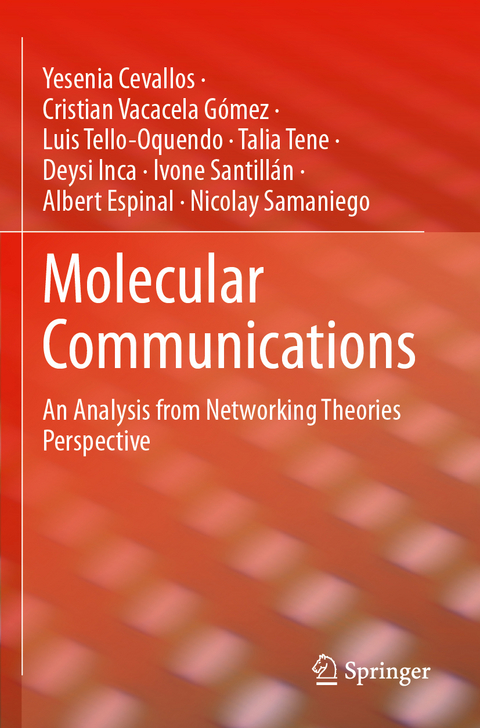
Molecular Communications
Springer International Publishing (Verlag)
978-3-031-36884-4 (ISBN)
This book provides a complete analysis of molecular communications systems from the paradigm of TCP/IP network stack, and it exploits network theories (e.g. independent functions of a layer into a stack, addressing, flow control, error control, and traffic control) and applies them to biological systems. The authors show how these models can be applied in different areas such as industry, medicine, engineering, biochemistry, biotechnology, computer sciences, and other disciplines. The authors then explain how it is possible to obtain enormous benefits from these practices when applied in medicine, such as enhancing current treatment of diseases and reducing the side effects of drugs and improving the quality of treatment for patients. The authors show how molecular communications systems, in contrast to existing telecommunication paradigms, use molecules as information carriers. They show how sender biological nanomachines (bio-nano machines) encode data on molecules (signal molecules) and release the molecules into the environment. They go on to explain how the molecules then travel through the environment to reach the receiver bio-nano machines, where they biochemically react with the molecules to decipher information. This book is relevant to those studying telecommunications and biomedical students, engineers, masters, PhDs, and researchers.
Yesenia Cevallos has an Electronic and Telecommunication Engineer Degree from National Polytechnic in Ecuador, 2001. She has an Information Technology Master Degree from Technical University of Ambato in Ecuador, 2010. She has a Ph.D. Degree from University of Calabria in Italy, 2018. She is an Associate Professor at National University of Chimborazo, Ecuador, where she had worked from 2003. Her research area corresponds to the nano communications at molecular level.
Cristian Vacacela Gómez earned his Ph.D. in Physics and Quantum Technologies from the Università della Calabria (Italy) in 2017 and a Bachelor's degree in Biophysics from the Escuela Superior Politécnica de Chimborazo (Ecuador) in 2013. He is an Associate Professor at the Escuela Superior Politécnica de Chimborazo (ESPOCH, Ecuador) and an Associated Researcher at the National Institute for Nuclear Physics (INFN, Italy) with over 12 years of experience in research and teaching. He has published more than40 scientific works, including journal articles and chapter books, in high-impact journals covering different areas of interest such as materials science, photonics, nanosystem simulation, radiation physics, and mathematical models for medicine and the environment. Throughout his career, Cristian has received various awards and recognitions. He was a SENESCYT (Ecuador) scholarship holder from 2013 to 2017 to pursue his doctoral studies and received a scholarship from the Laboratorio Nacional de Frascati (LNF-INFN, Italy) in 2022 for postdoctoral studies. He serves as a reviewer for the journal Nature Communications (Springer), an academic editor for the Journal of Nanomaterials (Hindawi), and an associate editor for Coatings (MDPI).
Luis Tello-Oquendo received the electronic and computer engineering degree (Hons.) from Escuela Superior Politécnica de Chimborazo (ESPOCH), Ecuador, in 2010; the M.Sc. degree in telecommunication technologies, systems, and networks, and the Ph.D. degree (Cum Laude) in telecommunications from Universitat Politecnica de Valencia (UPV), Spain, in 2013 and 2018, respectively. From 2013 to 2018 he was Graduate Research Assistant with the Broadband Internetworking Research Group, UPV. From 2016 to 2017 he was a Research Scholar with the Broadband Wireless Networking Laboratory, Georgia Institute of Technology, Atlanta, GA, USA. He is currently an Associate Professor with the College of Engineering, Universidad Nacional de Chimborazo, Ecuador. His research interests include wireless communications, software-defined networks, 5G and beyond cellular systems, Internet of Things, and machine learning. He is a member of the IEEE and ACM. He received the Best Academic Record Award from the Escuela Técnica Superior de Ingenieros de Telecomunicación, UPV, in 2013; the IEEE ComSoc Award for attending the IEEE ComSoc Summer School at The University of New Mexico, Albuquerque, NM, USA, in 2017; the Extraordinary Doctoral Thesis Award from the Escuela de Doctorado, UPV, in 2019; and the Best Researcher Award from the Ecuadorian Corporation for the Development of Research and the Academy (CEDIA), in 2021.
Talia Tene holds a Bachelor's degree in Bioscience from the Escuela Superior Politécnica de Chimborazo (Ecuador), which was awarded in 2013. Additionally, she obtained her Ph.D. in Physics and Quantum Technologies from the Università della Calabria (Italy) in 2017. Currently, she is an Associate Professor at the Universidad Técnica Particular de Loja (UTPL, Ecuador), with over 10 years of experience in research and university teaching. She has more than 20 publications in high-impact journals covering both experimental and theoretical works. Her areas of interest include nanotechnology, quantum biology, and radiation physics. Throughout her career, Talia has received various awards and recognitions. She was a SENESCYT (Ecuador) scholarship holder from 2013 to 2017 to pursue her doctoral studies, receiv
Introduction.- Molecular communication network architecture.- Analysis of layer's tasks in molecular Application, Transport, Network, and Link layers.- Analysis of layer´s tasks in molecular Physical layer.- Case studies of applications of digital networks theories to molecular network stacks.- Conclusion.
| Erscheinungsdatum | 22.11.2024 |
|---|---|
| Zusatzinfo | XV, 197 p. 65 illus., 64 illus. in color. |
| Verlagsort | Cham |
| Sprache | englisch |
| Maße | 155 x 235 mm |
| Themenwelt | Technik ► Elektrotechnik / Energietechnik |
| Technik ► Nachrichtentechnik | |
| Schlagworte | ICT and Molecular communication systems • medical applications and molecular communication systems • Molecular communication network architecture • Molecular communication systems • networking theories and molecular communication systems |
| ISBN-10 | 3-031-36884-3 / 3031368843 |
| ISBN-13 | 978-3-031-36884-4 / 9783031368844 |
| Zustand | Neuware |
| Informationen gemäß Produktsicherheitsverordnung (GPSR) | |
| Haben Sie eine Frage zum Produkt? |
aus dem Bereich


